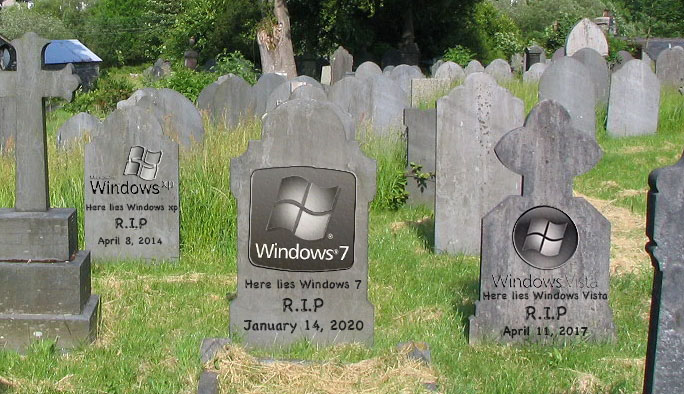Starting Tuesday, January 14, 2020, Microsoft ended support for Windows 7 operating system (OS). This marks the end of Microsoft’s 10-year commitment to support the OS which began in 2009. The company says this was necessary to focus investment on new technologies. Microsoft periodically ends support for outdated software. For instance, it stopped supporting Windows XP and Windows 8 in 2014 and 2016, respectively.
Suggested Read: Be prepared for the demise of Windows 7
This doesn’t mean the OS will stop working on devices, but continued use is strongly discouraged as it puts devices at a greater risk of malware infection.
Users are therefore advised to move to Windows 10, which is already on almost half of the world’s personal computers (PCs), based on figures recently released by Microsoft.
It is however not clear how much this affects Windows 7 on embedded devices like ATMs and fuel pumps since they “have lifecycle dates that sometimes differ from versions of Windows that are used on PC devices.”
However, it is worth noting that a Techpoint Twitter poll revealed a large percentage of Africans do not use genuine software on their PCs because of affordability.
Do you pay for, and use, genuine software on your laptop/computer?
— Techpoint Africa (@TechpointAfrica) December 10, 2019
This is confirmed by Microsoft’s statistics which show the number of PCs shipped into Africa against the number of genuine software purchased in the region.
Suggested Read: Microsoft wants to make genuine Windows PCs more affordable and accessible to Africans
When Windows 10 was first introduced, a free upgrade ran for a year. Though it was meant to end in 2016, users can still access an upgrade without charges. Conversely, on the Microsoft support page, it shows that an upgrade costs $139 with higher versions going for as much as $309 (Windows 10 Pro).
A case of affordability
With this development, an upgrade to Windows 10 or getting a new device running the genuine OS is recommended. However, this raises the question of affordability, and the average Nigerian would either stick with an outdated version or simply go with a pirated version of the Windows 10 software.
Techpoint found out from PC stores at the Computer Village, Ikeja, that getting a genuine Windows 10 software costs ₦25,000 ($69.08). But it appears users would rather get a cracked version which costs between ₦4,000 ($11.05) to ₦12,000 ($33.16), depending on the merchant. It can even go as low as ₦300 ($0.83) on a preloaded compact disk for users skilled enough to carry out the installation.
Clearly, it is no longer a question of whether these sellers/technicians inform PC owners of the security risks associated with using pirated software because it appears the users don’t mind.
We discovered from the reactions of some PC owners that it is a case of being aware of the need for an upgrade but going with a preferred option depending on what they can afford.
Are banks on red alert?
Away from PCs, we mentioned earlier that Windows 7 Embedded — a compartmentalised version of Windows 7 — used on ATMs might also be affected.
Following a suspicion of the likelihood of a similar incident that caused a panic among Nigerian banks in 2014 when Microsoft ended support for Windows XP, Techpoint visited a few banks to know the status of their ATM’s operating systems.
These banks claimed their devices were “periodically updated” but wouldn’t put a name to what software they presently run on. Regardless of their stand, banks are expected to take proactive measures to avoid exposing their machines to malware, intrusion, and other risks as there is nothing to indicate an extension by Microsoft.
Computers have become a part of our personal and corporate lives. It is therefore imperative to keep them as safe as possible irrespective of what it costs to do so.






